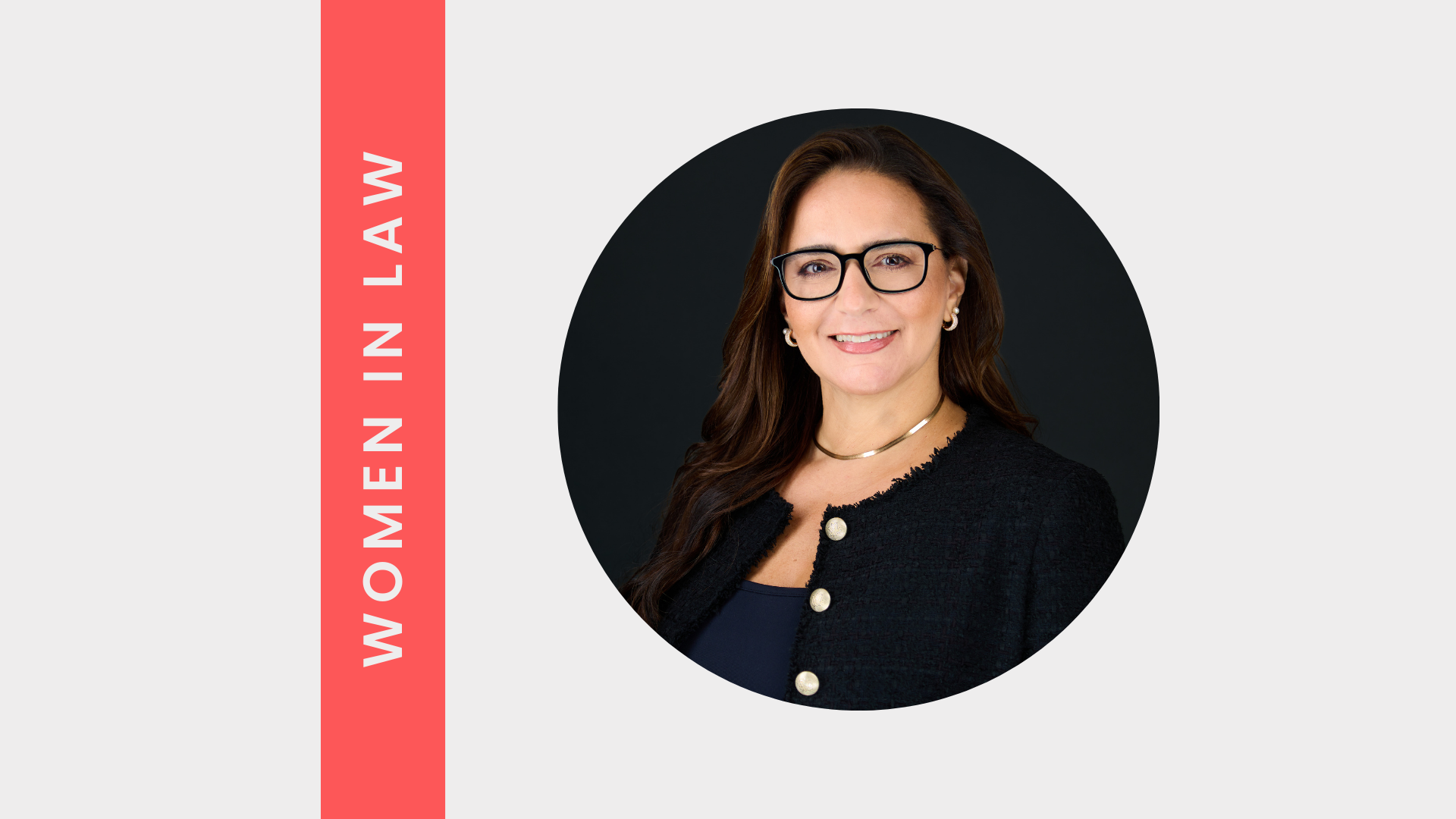Women in Law: Tabitha Jenkins
Introducing Tabitha Jenkins – Head of EMEA Enterprise Legal Team, Worldpay
We’re delighted to feature Tabitha Jenkins in our Women in Law series. Tabitha joined Worldpay in 2015, making the bold move from the world of banking and finance at Macfarlanes into a commercial-focused role, a baptism of fire that she has since turned into a remarkable success story. Today, she leads a large, high-performing team of commercial and regulatory lawyers across the region, from paralegals through to senior counsel.
Her impact extends well beyond the legal function: she is a Training Principal for the SRA’s in-house qualification programme, a regular speaker at internal and customer-facing conferences, and a passionate advocate for diversity and inclusion. In particular, Tabitha has been instrumental in opening up conversations within Worldpay around supporting families and fertility journeys, an area where her leadership has created space for greater understanding and support.
We chose to interview Tabitha not only because of her outstanding professional achievements, but also because of the meaningful difference she makes within her team and across the business. Her journey is a powerful example of resilience, leadership, and the importance of championing inclusion in the legal profession.
Can you share a bit about why you decided to go into law and what led you to move in-house rather than stay in private practice?
Back in the 90s there was a hit TV sitcom called Ally McBeal. Admittedly, the legal plot lines were tenuous, but the protagonist sauntered around sky rise offices wearing short skirt suits and I figured that was something I'd be pretty good at doing too. By 18 years old, I had a keen interest in English language, winning arguments and making money, so I picked a highly vocational degree in Accounting and Law with the hope this would stand me in good stead for a corporate future. I qualified into leveraged finance and worked for a number of years at CMS and MacFarlanes, but it was my secondments (at Value Retail, National Australia Bank, Intu and RBS) that really started to shape my future as an in-house lawyer. I realised that private practice and in-house lawyers required very different skill sets; whilst a strong understanding of the law is critical for both, an in-house lawyer also needs highly developed people skills as an internal diplomat, interpreter and manager.
What has been one of the most memorable moments of your legal career so far - and why?
Worldpay hosts an annual sales conference where we invite hundreds of customers to a three-day extravaganza in a swanky hotel to showcase our payments products, our people, and to have a bit of fun along the way. I was scheduled as a speaker on legal and regulatory updates, 'GULP'. Imposter syndrome was running high! Fortunately, an experienced colleague gave me some top advice to tell a story.
The day came, the entrance music marked my arrival, and I stepped up to the stage. I smiled, cracked a joke and then proceeded to take the audience on a journey through legal trends in AI, likening the capable but volatile technology to my toddler son (whom we lovingly moniker "Captain Chaos"). My hard work, killer slide deck and relaxed presentation style really paid off and I loved every second on stage. That experience was probably the transition point in my career from a lawyer to a leader.
What’s the one factor that has helped you most in your career?
Building relationships. You can be the best lawyer in the world, but your advice will fall on deaf ears unless you have established trust, collaboration and geniality with your colleagues and counterparts. My success is very little to do with talent and everything to do with surrounding myself with brilliant people that share my aspirational goals and optimistic disposition.
What advice would you give to women in the legal space aiming for leadership roles, particularly working mums?
Life certainly has a sense of humour; you reach a pivotal point in your career at the exact same time that your personal life is tied up with caregiving responsibilities for young children and/or aging parents. Traditionally the thought track has been that this somehow inhibits our potential as female leaders.
However, in my experience, both as a working Mum and as the head of a large team, it’s these busy women that make the most extraordinary colleagues. They are organised and efficient, highly empathetic, can multi-task like a pro and are ruthless at prioritisation. If an organisation treats its working families right (such as enhanced parental leave, return to work coaching and a progressive approach to flexible hours), these women become loyal employees, and their acquired knowledge and skill is retained within the business for years to come.
So rather than setting your career back, it’s actually your greatest asset. Leverage it!
What is the main thing you’ve seen in any organisation that you think enables women to progress?
Organisations are jammed full of bright, talented women that have remarkable potential but lack confidence in their own abilities. This is surprisingly simple to fix. Firstly, leaders should consistently celebrate good work when they see it, shout it from the rooftops “THIS WOMAN WAS AWESOME TODAY!”. Sincere words of encouragement have a huge impact on how content a woman is at work, which in turn bolsters self belief and accelerates high quality output.
Secondly, establish a robust internal mentoring network - this should include male allies and two-way relationships. Now I’m on track for my professional goals I’m seeking guidance from reverse mentors (by which I mean someone in the early years of their career) to help me to have a “less stress, more yes” mindset. Somehow this included buying a pair of rollerskates at the age of 39!
You’ve been open about your journey with IVF for your two children. What have you learned about navigating fertility in the workplace?
Infertility affects around 1 in 6 people globally - with those affected typically of working age. This is not just a personal issue, but a workforce matter that can remain invisible unless we create space for open, compassionate conversations. I tell my story to empower those thinking about their future family or on the fertility journey to know that they are supported.
At my girls high school it was drilled into me that if I so much as looked at the boys across the road, I would get pregnant immediately. It was, therefore, somewhat of a surprise when I got married, requested “one baby please” and none was forthcoming. I was working long hours in private practice and doing punishing sessions in the gym at weekends - a biological nightmare for procreation.
I moved to Worldpay and made lifestyle improvements, but it became clear that fertility treatment was our only way forward. This presented a conundrum - I was new to a role and in those pre-Covid times expected full time in the office. IVF is an awesome technology and a privilege, but it’s all-consuming with frequent appointments, financial stress and hormonal volatility. I had two options: (1) avoid “tipping off” my employers, but damage my credibility with unaccountable absences and unreliability; or (2) accept my vulnerability and tell the truth. Although scary, option (2) was by far the best outcome. Afterall, my boss was human, with a family of his own. He valued my honesty and supported my journey, particularly when we had emotional setbacks. He trusted that I would continue to work hard, just on an adapted schedule, and he wholeheartedly celebrated my success when - at last - I was expecting my baby girl.
What advancements do you hope to see for women in the legal industry in the next 10 years?
The advance of legal technology is great news for the industry as a whole, but particularly epic for women.
Firstly, the gift of time: a reduction in hours spent doing research tasks, due diligence or basic administration means more valuable work can be achieved in the working day and your evenings are liberated - leading to a healthier, happier workforce.
Secondly, the gift of information: traditionally, knowledge has been in the hands of a few gatekeepers, often men, that could make or break your career depending on how much of their time they made available to pass that information on. With the plethora of online tools, webinars and academies, its never been easy to upskill yourself, at a time that suits you. Power to the people!
What simple tips do you have for success:
- Be decisive. A bad decision is preferable to no decision.
- Fail fast, fix fast. If you are open to admitting your mistakes and correcting them with speed, then you can free yourself of the stresses of perfection.
- Find your unique selling point - the funkier the better. Have you been cultivating a sourdough starter named Bob, or spent the summer upcycling cabinets? Put this on your CV and give the interviewer a hook to know the real you (that’s the best bit!).
--------------------
We're committed to enabling our clients and candidates to thrive in a constantly changing world. By helping businesses grow and supporting people in leading more fulfilling lives both at work and beyond, we aim to make a lasting impact. Our ultimate goal is to become the world’s most valued and trusted workforce solutions company, trusted by our people, our clients and our communities.
Our latest insights







